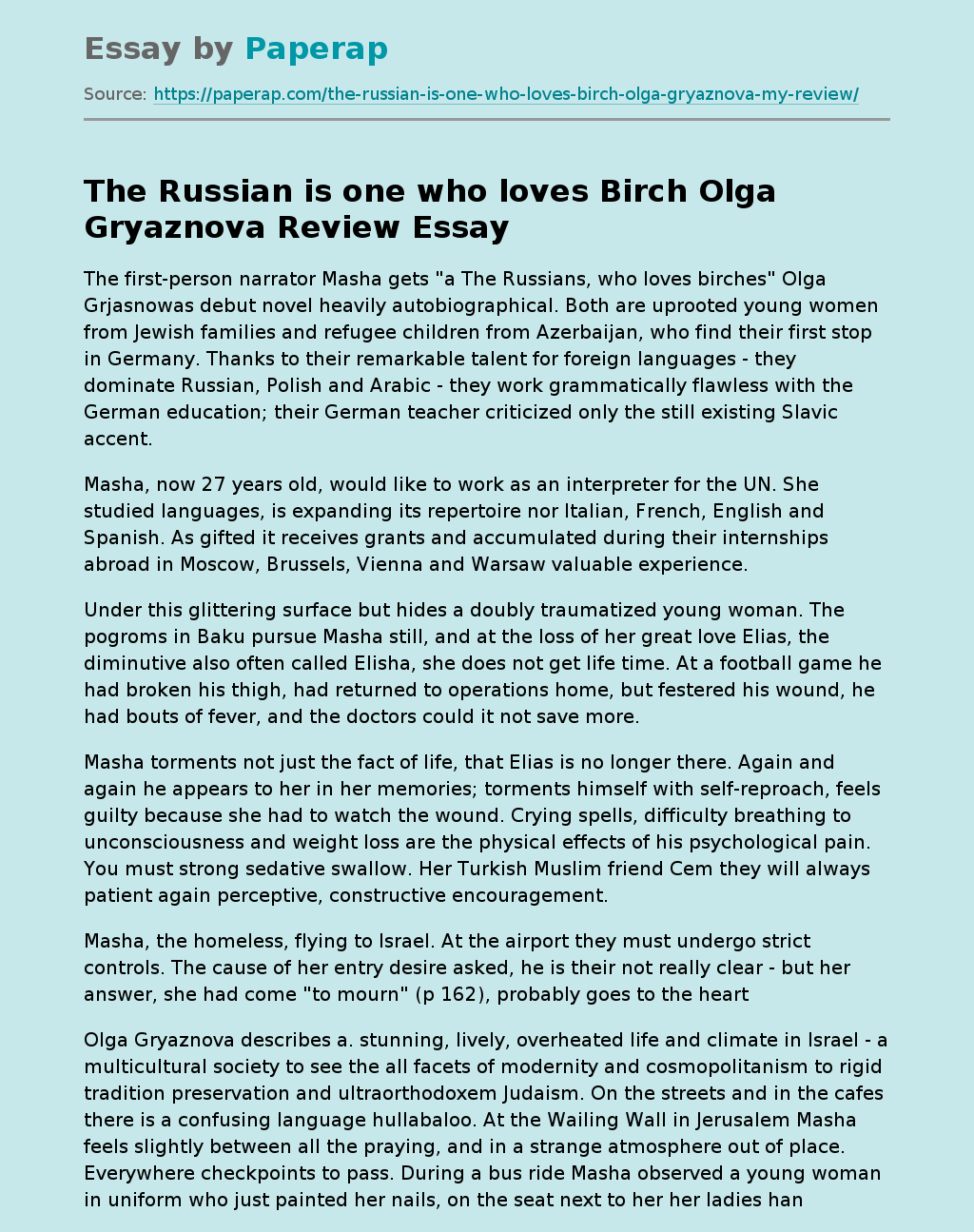The first-person narrator Masha gets “a The Russians, who loves birches” Olga Grjasnowas debut novel heavily autobiographical. Both are uprooted young women from Jewish families and refugee children from Azerbaijan, who find their first stop in Germany. Thanks to their remarkable talent for foreign languages - they dominate Russian, Polish and Arabic – they work grammatically flawless with the German education; their German teacher criticized only the still existing Slavic accent.
Masha, now 27 years old, would like to work as an interpreter for the UN.
She studied languages, is expanding its repertoire nor Italian, French, English and Spanish. As gifted it receives grants and accumulated during their internships abroad in Moscow, Brussels, Vienna and Warsaw valuable experience.
Under this glittering surface but hides a doubly traumatized young woman. The pogroms in Baku pursue Masha still, and at the loss of her great love Elias, the diminutive also often called Elisha, she does not get life time. At a football game he had broken his thigh, had returned to operations home, but festered his wound, he had bouts of fever, and the doctors could it not save more.
Masha torments not just the fact of life, that Elias is no longer there. Again and again he appears to her in her memories; torments himself with self-reproach, feels guilty because she had to watch the wound. Crying spells, difficulty breathing to unconsciousness and weight loss are the physical effects of his psychological pain. You must strong sedative swallow. Her Turkish Muslim friend Cem they will always patient again perceptive, constructive encouragement.
Masha, the homeless, flying to Israel. At the airport they must undergo strict controls. The cause of her entry desire asked, he is their not really clear – but her answer, she had come “to mourn” (p 162), probably goes to the heart.
Olga Gryaznova describes a. stunning, lively, overheated life and climate in Israel – a multicultural society to see the all facets of modernity and cosmopolitanism to rigid tradition preservation and ultraorthodoxem Judaism. On the streets and in the cafes there is a confusing language hullabaloo. At the Wailing Wall in Jerusalem Masha feels slightly between all the praying, and in a strange atmosphere out of place. Everywhere checkpoints to pass. During a bus ride Masha observed a young woman in uniform who just painted her nails, on the seat next to her her ladies handbag – and her heavy machine gun … The normal everyday madness: a dance on the volcano.
While Masha’s Jewish parents were once dedicated Communists, it is itself neither religious nor has political beliefs. Just she plunges into an affair with an Israelite woman and a Palestinian man. To rest it does not come in this vibrant country. Her melancholy, her depression and her nightmares paralyzing. In the final scene of the novel, it is helpless in the open field in Palestine, has nose bleeds, is incapable of acting like a little kid. Sami, her first lover from student days, do not hesitate: He brings them back to Germany.
Who is this Masha really.? As this final scene matches a cosmopolitan woman with an extraordinary sense of language? Actually, she just covered her deeply wounded soul – with pseudo-feminist behavior with free bisexual love with hot parties and drug use.
“The Russian is one of the birches love” – that is the remarkable debut of a young Russian, who is himself still not arrived. Born in Baku, Azerbaijan, 1984, Olga Gryaznova grew up in the Caucasus. After stays in Poland, Russia and Israel, they now studying dance at the Free University Berlin. She is a graduate of the German Literature Institute in Leipzig. In 2011 she received the commuters grant from the Robert Bosch Foundation.
The Russian Is One Who Loves Birch Olga Gryaznova Review. (2019, Nov 18). Retrieved from https://paperap.com/the-russian-is-one-who-loves-birch-olga-gryaznova-my-review/

